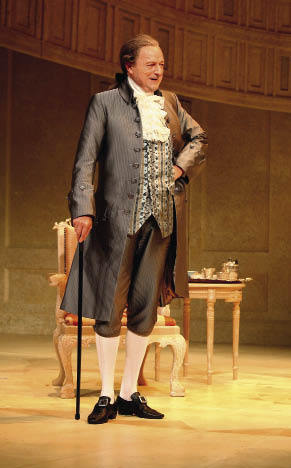Christmas approaches. And kitchens and playrooms across the land resound with the joyous tinkle of little Josephs and Marys rehearsing their roles in the Nativity play. My four-year-old son, making his debut in a farmyard cameo, has just one line, ‘I’m a donkey and I’m very tired,’ which he repeats endlessly to the delight of his beaming dad.
So I can only imagine the levels of pride surging through the families of Ciara Southwood and Madison Lygo as they prepared for the lead roles of Mimi and Janey in the Royal Court’s new play Kin, which is set in a girls’ prep school. The homes of these lucky ten-year-old actresses will have echoed with the play’s exquisitely turned dialogue. ‘Lazy shit,’ says Janey. ‘Did you see how she just fucking looked at me?’ says Mimi. ‘She’s a psycho.’ Janey: ‘Mr B’s a fat fuck.’ Mimi: ‘Fucking tell me, fuckshit.’ Janey: ‘You’re going to have to fuck everyone in your class.’ Mimi: ‘I fucking hate you, you dickwad, you fucking dick. You’re such a diiiiiick!’ And so on.
How their star-struck parents must have glowed with pleasure. How the visiting aunties must have sighed with joy at their nieces’ brilliance. How the neighbours, invited to overhear rehearsals on ingenious pretexts, must have thrilled at the authenticity of performances underpinned by lived experience. Mimi: ‘Go and knock on Mr Edwards’s door and tell him you want him to rape you.’
New writer E.V. Crowe presents us with a boarding school full of confused little wrecks who swagger and swear and bully to mask their emotional isolation and sense of abandonment. That’s perfectly believable. But it stretches credulity that these ten-year-old treasures have a familiarity with the weapons of sexual humiliation that wouldn’t disgrace the nonce-wing at Parkhurst. The brutality of the dialogue grates rather than shocks, and the characters are too shallow, damaged and out-and-out nasty to be sympathetic.
In recent years, the Royal Court has adopted an admirable policy of giving untested teenage writers a chance to shine. They discovered Anya Reiss (a real talent), Polly Stenham (capable and interesting) and now E.V. Crowe, who has ability and deserves careful handling. A full-scale production of this apprentice-piece is premature. It may even hamper her development.
The Court’s management should have sat down and straightened out some of the more elementary faults: the male parts are superfluous; the patchy plot never captures our loyalties; the surrogate mother-figure is poorly focused; endless phone calls are confusing; the idea that Mimi and Janey are affected by early-onset Lesbosis looks like a blatant attempt to spark a headline-grabbing frenzy of suburban outrage; and the suggestion that a ten-year-old girl might star as John Proctor in a transvestite school production of The Crucible is simply barmy. But I’m glad to report that the actresses playing the foul-mouthed little cherubs are genuinely impressive. ‘Thank fuck for that,’ as Janey might say. Sadly, however, the Court won’t admit under-14s to this play, even though it’s about them. ‘Bunch of fuckwads.’ Quite right, Mimi.
Peter Hall’s production of The Rivals has rolled into town. On looks alone the play is faultlessly cast. The nubile youngsters are svelte and lovely, the oafish grotesques are bent and carbuncled. In acting terms there’s a mixture of ability. Some of the younger company members are a little stiffer in the sinew than their elders, who handle the text with the audacious dexterity of jugglers and fire-eaters. And the production exposes the difference between a jobbing comedian and a natural. Naturals always know where the laughs are. Jobbers always seem to be trying to remember where they left them at the last performance. Penelope Keith, as Mrs Malaprop, gets the verbal comedy syllable-perfect and adds layers of pathos and feeling, particularly in the final act when she discovers how casually she’s been hoodwinked and slandered.
Tony Gardner, a natural like Keith, approaches the thankless role of Faulkland with undaunted gusto. The sulky resentfulness of his character operates as a foil to the dash and vigour of Captain Jack, but Gardner turns Faulkland’s priggish disaffection into something fresh, funny and even a little pitiful. Peter Bowles has an even stranger take on his role. Sir Anthony Absolute is usually played as a decent old charmer with a tyrannical streak. Bowles dismantles the part and reassembles it from scratch, placing tyranny at the centre and soft-focusing the charm and decency. It’s an amazing act of restoration. In the key scene where he browbeats his feckless heir, Bowles gradually lowers the volume and slows the heart-beat of the performance to suggest levels of menace and thuggery which are oddly disturbing but never lose touch with the glitter and polish of the comedy. It’s hard to imagine that Sheridan, of all writers, could feel Pinteresque. A piece of comic brilliance.







Comments